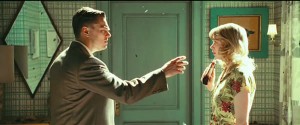SHUTTER ISLAND: 3 ½ STARS
 The last time Martin Scorsese went to Boston he had the biggest mainstream hit of his career and won an Oscar as Best Director. “The Departed’s” change of scenery seemed to do him good so it shouldn’t come as a surprise that his latest film is also set in the New England city, this time however, he isn’t telling a tale of gangsters, but a story of the criminally insane—“the bugsies” they call them—on an piece of land in Boston harbor called Shutter Island.
The last time Martin Scorsese went to Boston he had the biggest mainstream hit of his career and won an Oscar as Best Director. “The Departed’s” change of scenery seemed to do him good so it shouldn’t come as a surprise that his latest film is also set in the New England city, this time however, he isn’t telling a tale of gangsters, but a story of the criminally insane—“the bugsies” they call them—on an piece of land in Boston harbor called Shutter Island.
Returning for his fourth outing with Scorsese Leonardo DiCaprio headlines the all star cast, playing Teddy Daniels, a US Marshall assigned to investigate the disappearance of a patient on the isolated Shutter Island asylum. Working with Chuck Aule (Mark Ruffalo), his new partner, he must keep a close grip on his own sanity. Is he insane or is he being driven insane?
I’ve kept the synopsis deliberately vague because there is so much going on in “Shutter Island,” it is such a house of cards that revealing one detail too many could bring the whole thing down and spoil the experience of seeing it through fresh eyes. This will be a no spoiler zone, but that means being light on the details.
“Shutter Island” (adapted from a Dennis Lehane novel) is likely the most enigmatic movie Scorsese has ever made. It’s a bold, risk-taking film, ripe with dramatic music, sweeping photography and unapologetically strange storytelling. It’s a story of paranoia, a deeply psychological thriller that pays homage to Hitchcock films like “Vertigo” and “North By Northwest.” Throw in a dollop of “The Snake Pit” and some Mario Bava you get an idea of the tone of the film.
He uses flashbacks, odd and deliberate lapses in continuity, weird camera tricks—he runs the film backwards in one scene so it looks like smoke is flowing into, rather than out of DiCaprio’s cigarette—to create an atmosphere of creeping dread, one in which the viewer, and perhaps even the characters don’t know what is real and what is not. Where many of his earlier films like “Raging Bull” and “Goodfellas” are about a state of existence, “Shutter Island” is all about a state of mind.
Anchoring the film is a fantastic performance from DiCaprio who by times seems to be channeling Jimmy Stewart. Not the “Philadelphia Story” Stewart but the edgy, post war Stewart of “Rope” and “Vertigo.” His performance seems artificial, as though he has spent too much time watching film noirs, but watch for the subtleties, the way he suggests his character’s hidden depths with interesting line readings and reactions. It’s a brave performance and one that doesn’t reveal itself entirely until the film’s final moments, but it’s one that will hold up to multiple viewings.
The movie, for all its boldness, however, may not. It is perhaps a bit too enigmatic for its own good, its twist ending is unconvincing and a bit of a letdown, (for once I was wishing for a little M. Night Shyamalan influence), but even Scorsese’s missteps have more interesting filmmaking than most other films at the multiplex.
“Shutter Island” is a difficult movie that demands more than most audiences are probably willing to give these days. It’s an art film disguised as a police drama and will probably leave the crowds who loved “The Departed” scratching their heads.
